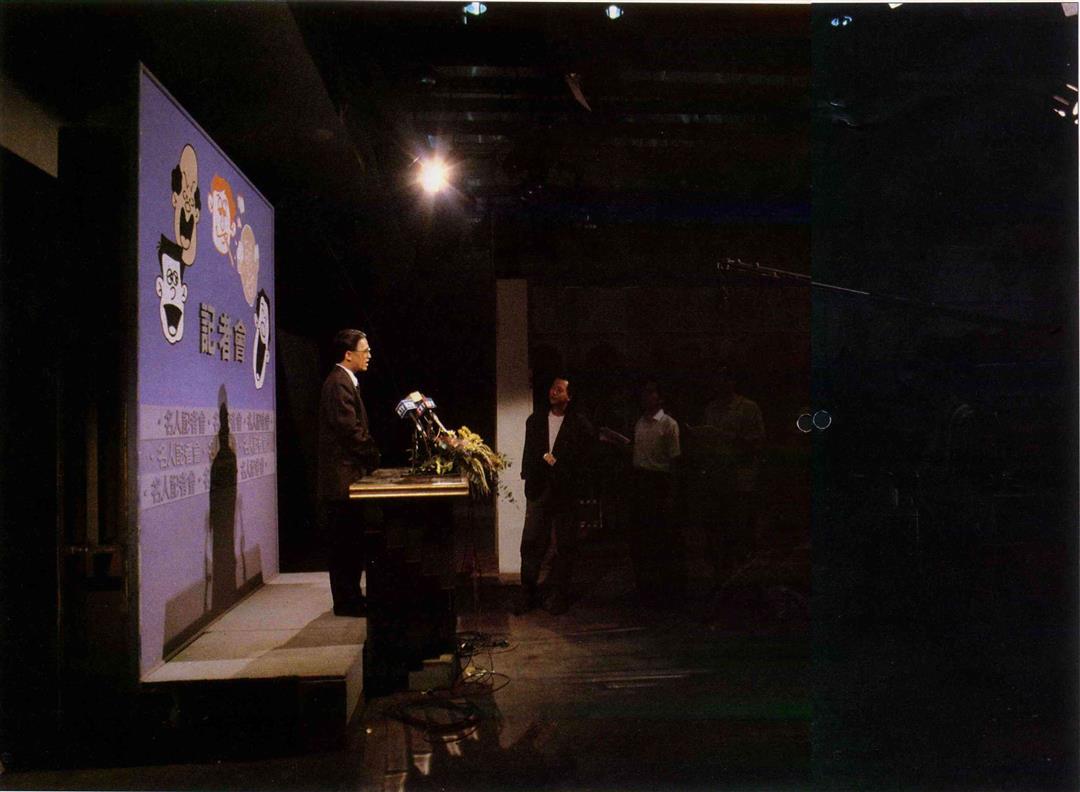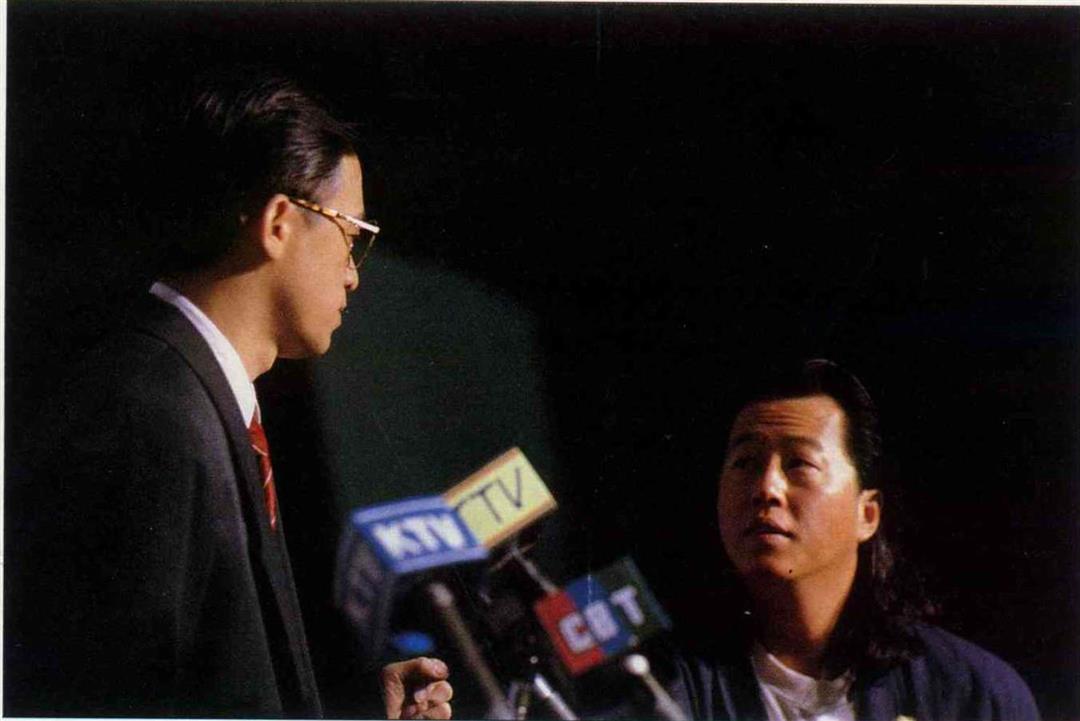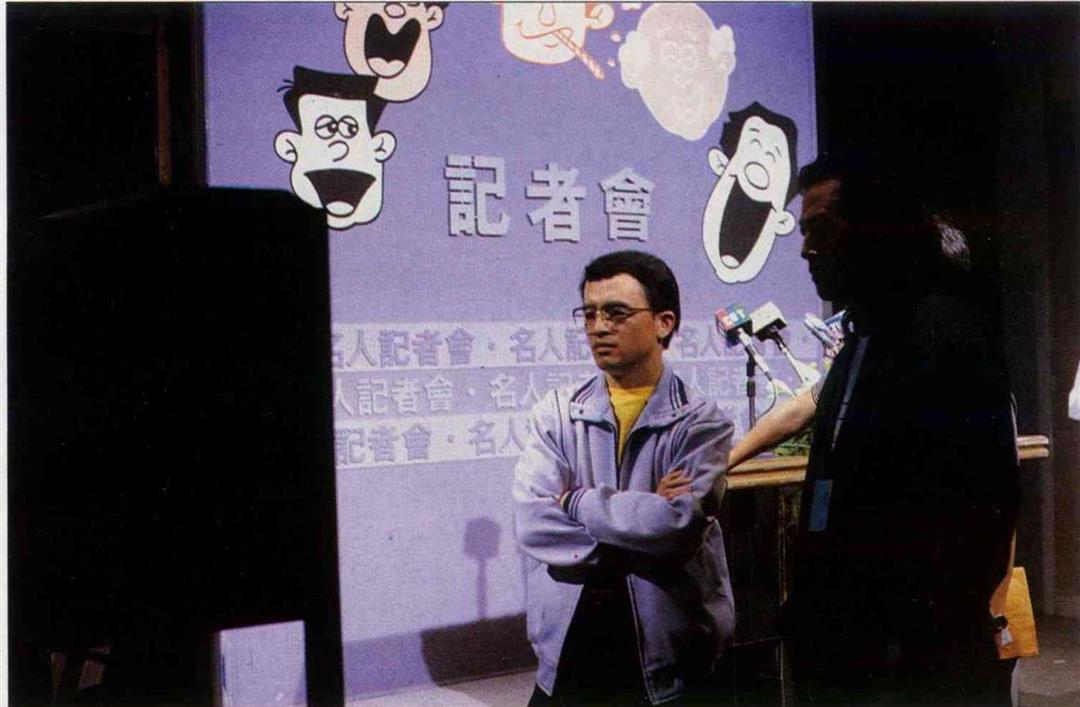Press Conferences Just for Laughs
Wei Hung-chin / photos Vincent Chang / tr. by Phil Newell
July 1992

I've heard that party contributions for the Kuomintang are not going so well. Mr. Spokesman, what's your view?
Everyone must be a little more active! You can't call for the chairman to come out and ask people for money! The financial situation of the party today is not good, so if everyone just "contributes one pocketful" then they can "save one party."
When did James Chu ever ask for contributions to the Kuomintang in such an exaggerated way? Don't take it for real, because it's just the comedian Teng Chih-hung having another one of his "press conferences" on television--so just relax!
Perhaps it goes too far, but it has a core of truth.
Recently some people have seen leading political figures in the ROC rushing home early from their obligatory social functions. The reason why they want to get home so early is not connected to family matters. They all want to be home to turn on the TV at 9︰30 sharp, not wanting to miss Teng Chih-hung's mimicking of political figures. They are waiting with great curiosity--who will have their press conference tonight?
Who's meeting the press tonight? Teng Chih-hung is really the first one ever to bring mimicry of public officials to the TV screen. The program takes the format of a press conference, and each time he takes the role of some political personality, fielding queries cast by "reporters" sitting below. The questions are naturally on the latest "hot" issues.
For example, Taipei County Magistrate Yu Ching opposes the construction of the Fourth Nuclear Power plant, and has been claiming that he would even go so far as to call out militia to prevent construction from beginning. Teng Chih-hung thus played Yu Ching in calling a press conference, and copied Yu's tone of voice: "I have to go and train the militia!" When Y.S. Tsiang, secretary-general to the President, visited Korea, Teng played Tsiang, talking up ROC-ROK relations. In recent days the exchange rate of the NT dollar has become a popular theme, so Teng Chih-hung naturally turns into Central Bank Governor Samuel Shieh ....
The point of a variety show is to give you a laugh and so the contents are amusing. And often the most sensitive issues between the two political parties which give rise to tense confrontation can, in the midst of ridicule, give one pause to drop prejudices and rethink.
When talking about the "Teng Chih-hung effect" in the political world, Kuomintang Department of Cultural Affairs Director James Chu says, "Lately when political figures have gotten together they often tease each other--be careful, tonight Teng Chih-hung might be imitating you!"
Deng Xiaoping coming to Taiwan? Thanks to his imitations, on the street Teng Chih-hung is already used to hearing people call him "minister," "director," and even "Chen Shui-pien" (a leading Democratic Progressive Party politician). Once when he was in the Taichung Museum of Fine Arts, a guy who had "gangster" written all over him said from behind, "Hey Chen Shui-pien, Chen Shui-pien!" Teng didn't pay him any heed until the other guy finally changed to "Teng Chih-hung!"
Teng Chih-hung is slightly built, but in the make-up room he broadens his waist a bit with clothing, brushes white into his hair, and wears thick spectacles, saying with a thick Chekiang accent, "we'll talk about it some more, we'll talk about it some more." He has become Y.S. Tsiang, secretary-general to the President. In a moment "Y.S. Tsiang" takes off his jacket, puts on a "Jesus Is the Hope of the World" T-shirt, does up his hair so that it looks a bit short, and says from time to time, "Pay your taxes! Everybody must pay their taxes!" Yes! He has become Minister of Finance Wang Chien-shien. A short time later he brushed white back into his hair, squints his eyes tightly, puts on a Szechuan accent, slips into a Mao jacket... has Deng Xiaoping come to Taiwan to hold a press conference?!
After seeing Teng Chih-hung copy his tone of voice and expression. Yu Ching could only sigh, "This Teng fellow is really amazing. I don't know how he learned that Kaohsiung countryside accent, it's really identical, really identical!"
Smashing political myths: In fact Teng is not the first person ever to imitate politicians. Seven or eight years ago the actor Li Li-chun imitated several leading politicians such as former president C.K. Yen, Lin Yang-kang (currently president of the Judicial Yuan), and former premier Y.S. Sun at some festive occasions. In recent years the political atmosphere has been greatly relaxed, and Chang Fei, Hu Kua, Fei Yu-ching and others have been imitating political personalities in their dinner theater acts, to a great reception it is said.
As early as three years ago, Teng had already begun his mimicry in dance hall shows. Only three months ago, at the invitation of television variety show producer Wang Wei-chung, did Teng finally get his political impersonations on TV. Because both Teng and Wang have the same ideal of "exploding the myths of political personalities," they cooperated happily together, and thus began the televised "fixing of political personalities."
An old grandmother who sells noodles, who ordinarily doesn't know much about politics, after watching Teng imitate Democratic Progressive Party Chairman Hsu Hsin-liang talk about that party's primary election troubles, began to understand that before the year-end elections the DPP would "have their own election first!" as she says.
Even grandma is talking politics: Even the old grandmas can talk politics! This indeed was one of the goals that Wang and Teng hoped to achieve in putting the political impersonations on the TV screen. "All political affairs and personalities are subject to public scrutiny," says producer Wang, that's the only way you can let everybody know what "politics" really is all about. And to let everyone think about what it is they really want.
Teng Chih-hung, however, looks at the impersonations from the performing angle. He considers that to "play out" some events using a lighthearted, satirical manner, can give the viewers a chance to look at political news and slogans with a cool head.
"My performance must definitely be based on fact," he says. He reveals that in order to go on TV to impersonate a political figure, he has to scan numerous reports so that he can get to the heart of the matter.
Further, in order to get it exact, he will repeatedly watch videotape of the person whom he intends to imitate in order to learn his or her special characteristics. "If you can get the voice, the posture, and the gestures down to about 60-70%, that's enough," states Teng. If you add a little humor to the contents, and make even yourself want to laugh, then that's a successful show. Among the more than 20 personalities Teng has mocked, Teng gets the most satisfaction out of doing Y.S. Tsiang, Chen Shui-pien, James Chu, Wang Chien-shien, and Samuel Shieh. If only he's imitating one of these, he can get it right as soon as he goes out to perform.
Can't get Premier Hau: Despite having the ability to copy accurately, there are still people who Teng can't impersonate. "No matter what I do, I can't get that authoritative air that Premier Hau has," states Teng Chih-hung. On Labor Day (May 1) this year, the Chinese Federation of Labor held a celebration in the Taipei Social Education Hall. He accepted an invitation to go and imitate political personalities, and Premier Hau was in attendance. Before the celebration got under way, the CFL president Hsieh Shen-san told him that Premier Hau really likes his show, so "don't worry, just go out and impersonate Premier Hau as well as you can, and you can fall back on the six million working people in the country." Hsieh Shen-san boosted Teng's morale, but in the end Teng still didn't do Premier Hau, because "if you can't get someone right, then you can't get someone right," he says.
Besides Premier Hau, there are a few others Teng has sworn to give up, such as legislator Lin Cheng-chieh, whose voice Teng describes as "splitting bamboo"; former DPP Secretary-General Chang Chun-hung, who always has a "tragic" or "concerned" expression on his brow, and "isn't humorous in the least"; or the "too handsome" vice chairman of the Mainland Affairs Council Ma Ying-jeou. All of them are impossible to imitate because of "innate limits."
Unintended benefits: Also, there are those whom Teng himself originally thought he couldn't get, but after trying, found that he reaped unexpected success. Chen Shui-pien is an example. "To tell you the truth, originally I didn't like 'Ah Pien' much--he seemed a little too aggressive," says Teng Chih-hung. Nevertheless, in order to imitate Chen, he got some videotapes of Chen making interpellations in the legislature and found out that in fact the contents of Chen's questions were very down-to-earth and topical. After careful practice, the Chen Shui-pien impersonation has become one of Teng's trademarks.
Generally speaking, the political atmosphere in the country has opened up quite a bit in recent years, and political personalities mostly have the class to accept being ribbed. Says James Chu, "This means that the domestic political climate is progressing."
Chu says that when he was studying in the United States, he often saw actors on TV imitating the president. At that time he thought, "if one day someone in Taiwan can go on TV and do an impersonation of the president, that means that the domestic political environment will have reached maturity." Thus, although he has become a regular target of Teng's political mimicry, he is still quite happy about this phenomenon.
Chen Shui-pien believes that, although a political impersonation show does not necessarily reflect political reality, behind the laughter it can give political personalities some food for thought. "If the criticism of me in the show is accurate, I'll change; if not, I can congratulate myself," he says.
How long can it last?: The popularity of political impersonations is at its peak, but no one knows whether it can continue without fading.
Li Li-chun, who early on did some political impersonations in nightclub shows, notes that political mimicry is just one way of performing, and doesn't necessarily have some profound meaning just because it is connected to politics. "In fact, to make a game out of playing political personalities is not only something you can see on TV or in clubs, but even in street-side acts, so after a while it will lose its freshness," he concludes.
Also, lurking behind the surface appearance of "openness," do political impersonation shows have any negative effects? Kuo Li-hsin, a lecturer in the Department of Broadcasting and Television of National Chengchih University, argues that at this point it's hard to say what negative or positive value it will have, but if the audience is just satisfied with this outlet, and abandons normal channels of political participation, such as lowering willingness to vote, then "this might not be such a good thing for political participation itself," he points out, raising an alternate possibility.
Two-man show, one-man performance: Today 43, Teng Chih-hung, who has been floating around the entertainment world for 16 years, is now a hot property thanks to the political impressions. But will he thenceforth be a central part of variety shows? Not only Li Li-chun doubts it--even Wang Wei-chung and Teng Chih-hung themselves don't dare to offer any definitive conclusion. "It's takes too much effort to come up with materials for political satire, and it takes a lot of time to develop and organize," says Teng. If his performances on TV can go for more than half a year then that can be considered a success.
In order to get beyond the current "one man" format, Teng intends to develop a two-man dialogue format, with him also playing the role of the dialogue partner. "Wait until I'm ready, and then on that day everybody can see me doing both Chen Shui-pien and [Minister of Defense] Chen Li-an, with 'the two of them' going at it over national defense issues. Maybe we could even have John Chang [political vice minister of Foreign Affairs] and Frank Hsieh [DPP legislator] each having their say replaying the great debate," he says, laughing confidently.
Please listen to what everyone has to say: Eleven years ago, at the Golden Bell Awards, Golden Bell Award presenter Kao Ling-feng imitated James Soong, then the head of the Government Information Office, causing Soong, who was sitting in the audience, to break up in laughter. However, this light interlude was not shown to viewers because the person who was then in charge of relaying the broadcast found it "too sensitive."
Eleven years later, a political impersonation show goes on TV every night making its audience laugh delightedly. The domestic political environment has continually been becoming more and more open, and Teng Chih-hung's "press conferences" are one gratifying indicator. Wang Wei-chung, who produces the show, says that people are often concerned whether or not the producers are ever put under any pressure. "So far, really not at all," he responds.
"Parodying politicians lets everyone know that political figures are also something people can discuss, that bringing the 'official' and everybody face to face on TV is to hear what everybody has to say, and not just for everyone to listen to what they have to say." That's the "official" Teng Chih-hung explanation.
[Picture Caption]
Through impersonation, the reappearance of the words and gestures of political figures inside the studio is really a laugh.
Chuang Heng-tai? Chen Shui-pien? Hsu Hsin-liang? Shih Ming-teh? No! I'm Teng Chih-hung! (photo courtesy of the Fulung Company)
Wang Wei-chung and Teng Chih-hung cooperate to make light of political personalities on TV every night.
If you laugh yourself after seeing the film, then that's a successful impersonation.

Chuang Heng-tai? Chen Shui-pien? Hsu Hsin-liang? Shih Ming-teh? No! I'm Teng Chih-hung! (photo courtesy of the Fulung Company)

Wang Wei-chung and Teng Chih-hung cooperate to make light of political personalities on TV every night.

If you laugh yourself after seeing the film, then that's a successful impersonation.




@List.jpg?w=522&h=410&mode=crop&format=webp&quality=80)


